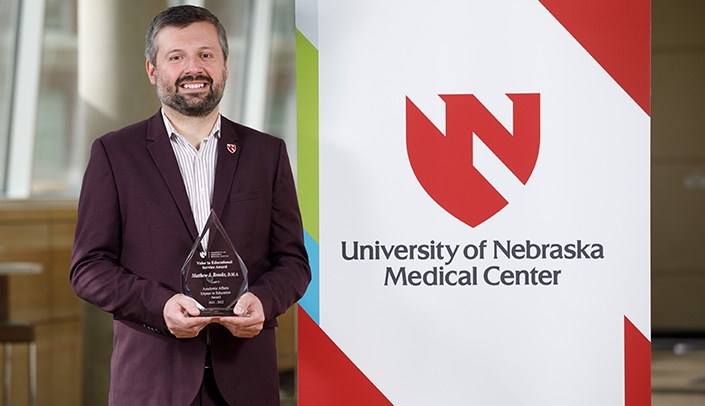Matthew Brooks, DMA, assistant professor, University of Nebraska at Omaha School of Music, and music director/conductor, Nebraska Medical Orchestra, is the recipient of the Valor in Education Service Award. The award recognizes volunteer, emeritus or adjunct faculty whose daily service to our learners exemplifies the spirit of outstanding teaching or clinical supervision.
- Name: Matthew Brooks, DMA
- Title: Director of orchestral activities in music & medicine, assistant professor, University of Nebraska at Omaha
- Joined UNMC: 2018
- Hometown: Lakeville, Massachusetts
You are the recipient of the Valor in Educational Service Award. Why is “service to our learners” important in health care education?
My work with student, faculty and staff learners is in the humanities — specifically music — which is not often considered essential in health care education. However, research shows exposure to and involvement in the humanities can provide a positive impact on the personal qualities of health care students and professionals while also improving their perception of personal wellness, including a reduction in their symptoms of stress and burnout. For me, service to our learners is so critical because they may not have humanities requirements built in to their academic and clinical programs. Therefore, my work, albeit optional for our learners, provides an opportunity for this important participation in music. While it may not eliminate the cause of stress and burnout, it can certainly improve their experience and strengthen their resilience when in the profession.
Describe your proudest moment as an educator.
My proudest moment as an educator is when I see students achieve and reach their goals — whether it be short-term within the academic year or longer-term once they have entered the professional world.
Do you have a favorite quote or philosophy on teaching? It is especially important in medical education to create “windows” for our students to view others’ experiences with greater compassion and understanding while also creating “mirrors” for students to reflect and see themselves in order to create a greater sense of belonging. The humanities can help — but all educators can work to create windows and mirrors applicable to their own teaching.
